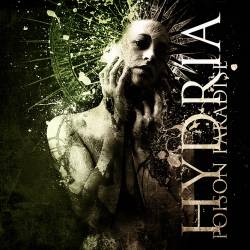Hydria - Poison Paradise

CD Info
2010
Independent Release
13 Tracks
English Lyrics
When a little-known band opens shows in its home country for popular bands it admires, it can suddenly capture the world’s attention. That’s what happened for Brazilian symphonic metallers Hydria. In 2008, the same year that Hydria released its debut album "Mirror of Tears," the band supported Within Temptation and Tarja Turunen – two of Hydria’s influences – in separate shows across Brazil. Word about Hydria spread via the Internet, and worldwide demand for "Mirror of Tears" soared. It’s no wonder why: Hydria creates sugar-voiced, lavishly orchestrated metal similar to that of its aforementioned idols. However, when a band’s career takes off, so do people’s expectations of the band’s music. And, after listening to Hydria’s sophomore album "Poison Paradise," it’s clear to me that the band wants to capitalize on its initial success. However, will fans rush to record stores and digital platforms to buy this album – or will they choose to skip it altogether?
The overall sound on "Poison Paradise" may be the deciding factor. In some ways, Hydria’s style hasn’t changed much. The band has maintained its focus on bombast and melody, with some evolution. The string arrangements are more dramatic, the keyboard lines more prevalent, and singer Raquel Schüler’s tender vocals a bit more mature than on "Mirror of Tears." If you listen closely to "Poison Paradise," however, you’ll notice it’s not as complex as Hydria’s debut. The songs are shorter and more succinct, and make less use of guitarist Marcelo Oliviera’s growls and solos. In fact, the guitars act as more of a rhythmic component to the music. This gives "Poison Paradise" a symphonic-drenched, pop-inspired feel similar to Delain and Tarja’s latest efforts.
The "commercial" elements – mostly catchy hooks and simple song structures – work to some extent on "Poison Paradise." "Finally" has a pulsing beat and piping strings that together create a thrilling hook that surges even more when it plays alongside Raquel’s clearly sung chorus. As for the ballads, they all adhere to the standard verse-chorus structure. The most endearing one is "When You Call My Name," where Raquel coos an apology to her lover over slow riffs and fluid piano notes. Other ballads don’t benefit from their simplicity. The mechanical feel of "In the Edge of Sanity" drains the piece of its emotion, while "The Only One" is too twangy and treacly to fit with the rest of the album.
"Poison Paradise" doesn’t have many heavy tracks, but the few it has are charming. "The Sword" and "Time of My Life" have strong power/speed metal influences, thanks to double-kick drums and Oliviera’s rapid-fire guitar riffs. The title track, on the other hand, features a healthy balance of aggression and delicate melodies. The strongest of Hydria’s heavy tracks, though, is "The Place Where We Belong." It’s full of contrasts, from Raquel’s gentle harmonies to the lashing drums and riffs. And, its intro is terrific: The interweaving rhythms of the strings, guitars, and drums create a vibrant storm of sound that gets more addictive with each listen.
Enjoyable as "Poison Paradise" is, it’s riddled with inconsistencies. Some songs suffer from weak melodies, causing tracks that have glimmers of brilliance ("Time of My Life," for example) to lose their luster. Other songs such as "Distant Melody" sound rushed, as though the band didn’t finish writing them. These small glitches can all be boiled down to the album’s hit-or-miss poppiness. Yes, it’s responsible for some of the best songs on "Poison Paradise." It even adds to the melodrama and dynamism of some of the heavier tracks. However, while the "commercial" elements enhance some songs, they detract from others. "Sweet Dead Innocence" is the worst of these casualties. The effervescent, almost celebratory music sounds good on its own, but it doesn’t mesh well with Raquel’s lyrical protest against sex trafficking ("Beautiful girl, she’s only thirteen / Sweet innocence for sale / The price is too high"). Thus, it’s difficult to take this otherwise beautiful song seriously.
All flaws aside, Hydria’s "Poison Paradise" is a pleasant second effort. It betters "Mirror of Tears" in final sound quality and the band’s overall performance, especially with the sweeping symphonics and Raquel’s delivery on vocals. And, there is enough variety in the music and lyrical content to prevent the album from falling into the trap of repetition. The pop factor will be a polarizer, though: Some listeners won’t care for it, while others will embrace it. If anything, "Poison Paradise" shows a band that’s still searching for its way to stand out in the increasingly crowded pool of symphonic metal. This album may only make ripples, but with more experience and honing of its songwriting, Hydria could become a major player in the South American metal scene.
7.5 / 10
Best Songs: "Finally" & "The Place Where We Belong"
Recommended for fans of female-fronted symphonic metal or bands such as Delain, Xandria, Tarja & Within Temptation
Click here to find out where you can purchase "Poison Paradise".
